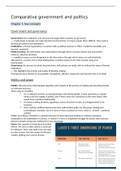Samenvatting
Summary comparative politics and government sammenvatting
- Instelling
- Tilburg University (UVT)
dit is een gedeeltelijke samenvatting van het boek comparative politics and government die gelezen moet worden bij het vak politcal science
[Meer zien]





